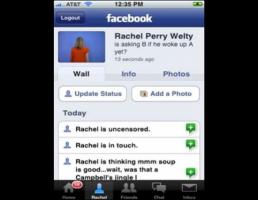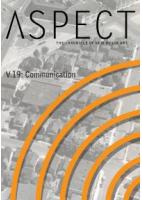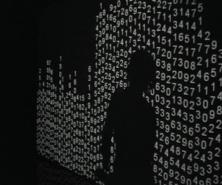Rachel is
You are missing some Flash content that should appear here! Perhaps your browser cannot display it, or maybe it did not initialize correctly.

On March 11, 2009, from 7:35 a.m. to 10:56 p.m., I performed “Rachel is” in my status bar on Facebook. Every sixty-seconds during waking hours I attempted to faithfully answer the question posed in the status bar, "What are you doing right now?" in an effort to raise more questions about narcissism, voyeurism, privacy, identity and authority as issues we consider in a technologically modern world.
To my great surprise, word spread in a viral fashion, and moments into the performance I was fielding friend requests which eventually numbered in the hundreds. (It was necessary to become my “Friend” in order to view and participate.) People from China and Switzerland, New Zealand and England, as well as all across the USA tuned in.
Usually artists work alone and I thought this would be a solo endeavor. However, I quickly realized, through the comments option and messages sent through Facebook, that like a marathon runner, I was being followed and cheered on throughout the journey. I found that many strangers, acquaintances and friends (often to their own astonishment) were weirdly fascinated in the minutia of my day. I think that people found it oddly compelling not so much because of me, but because of themselves. That is, people are comforted to know that we all deal in tiny, pointless stuff each day. We share the small moments that form the ballast for our lives. Each little update is insignificant on its own, supremely mundane, but over time they coalesce into an astonishingly sophisticated portrait, much like a pointillist painting. This aggregate phenomenon is akin to my process of making a drawing or a sculpture; it is an accretion of marks or gestures.
Facebook changed the interface the day after my performance, so that the question in the status bar is now a more vague, “What’s on your mind?” This shifting characteristic of technology, the ever improving software and the move toward obsolescence each day is reflected in my experience of the continual updating of my status.
Rachel Perry Welty
Boston, Massachusetts
March 25, 2009


